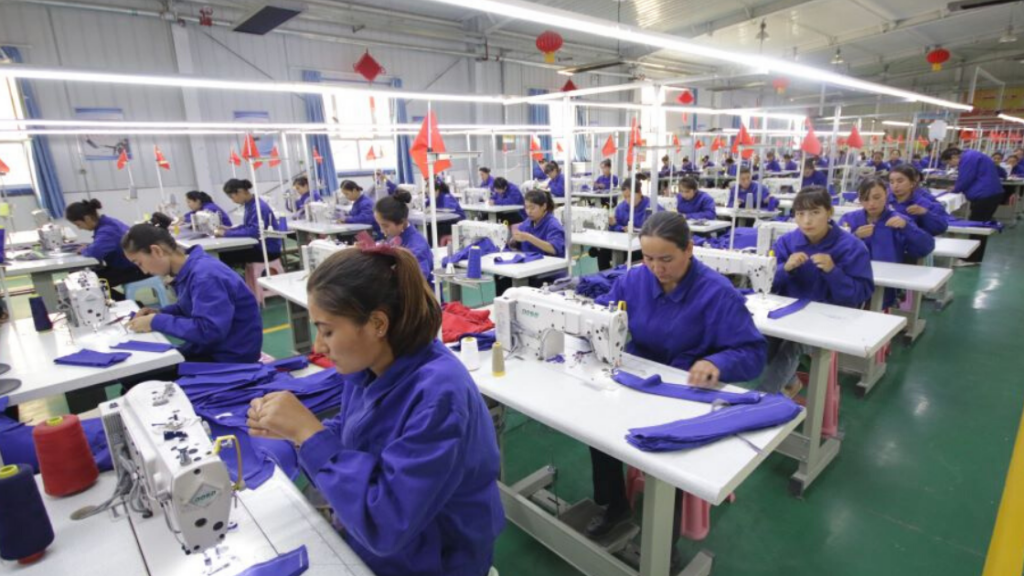Editor’s note: Michael Stumo asks, in this op-ed: Why do we let Chinese companies sell products made with forced labor in our market when we do not allow US companies to do it?
This past December, a London family bought a package of Christmas cards to mail to friends. Their 6-year-old daughter opened one of the cards and found a note that said: “We are foreign prisoners in Shanghai Qingpu Prison China. Forced to work against our will. Please help us and notify human rights organization.”
[Michael Stumo | March 17, 2020 | Washington Examiner]
This was no joke. The harsh truth is that Beijing’s regime oversees forced labor throughout China, and not only has Beijing targeted Uighurs and other ethnic minorities for coerced labor, but some of the world’s most well-known brands, including Apple, BMW, Gap, Huawei, Nike, Samsung, Sony, and Volkswagen, have benefited from the arrangement. The public should be deeply troubled by such abuses and should urge Washington to take action.
A new study by the Australian Strategic Policy Institute, or ASPI, gets to the heart of the matter. The ASPI reports that laborers in China are being transported from the far west region of Xinjiang to factories across the country. The resulting conditions “strongly suggest forced labour,” and at least 83 well-known global brands have used this coerced labor to manufacture their products.
Since 2017, more than 1 million Uighurs and other minority groups have been forced into a vast network of “indoctrination” camps in the far west region of Xinjiang. Many are then transferred onward to factories in nine separate Chinese provinces.
It’s estimated that at least 80,000 Uighurs were transferred out of Xinjiang between 2017 and 2019 alone. After relocation to distant factories, the workers were housed in segregated dormitories, given “ideological training,” subjected to constant surveillance, and banned from participating in religious activities.
This inhumane treatment shouldn’t surprise those who study China’s regime. For the past 25 years, China has used a host of aggressive practices to build itself into a world-leading economy. In the steel industry alone, massive subsidies have allowed China’s state-owned companies to dump a glut of steel across world markets, and China now produces more than half of the world’s steel.
Such predatory behavior is repeated in industry after industry. Beijing also directs a systematic effort to steal technology from U.S. firms. China’s Ministry of State Security deploys roughly 40,000 intelligence officers abroad to assist in cyberenabled espionage. And such IP theft costs U.S. companies an estimated$180 billion to $540 billion annually.
Beijing’s repressive regime consistently persecutes religious and ethnic minorities and uses their labor to help boost the country’s manufacturing output. Warnings of such practices have been an issue since the late 1990s, when the Clinton administration started pressuring congressional Democrats to expedite Beijing’s entry into the World Trade Organization. All of this came to a head in 2000, when Congress voted to grant normalized trade status to China.
At the time, some were troubled by reports of China’s labor abuses. Sen. Paul Wellstone of Minnesota introduced an amendment requiring China comply with international conventions regarding prison labor. However, the amendment was soundly defeated.
A year later, the Clinton administration helped usher Beijing into the WTO. In the two decades since, the United States has learned a hard lesson: Beijing has not moved closer to democracy. Instead, China has vastly expanded its reach and influence and built up a military presence in the South China Sea.
Driving much of this growth has been an explosion in China’s highly profitable trade surplus with the U.S., which now runs to hundreds of billions of dollars annually and has cost an estimated 3.7 million U.S. jobs since 2001.
With all of that said, a gut check is in order. Does the public really want to keep buying products made with forced labor — the toil and sweat of tens of thousands of Uighurs and other minorities branded “undesirable” by Beijing?
It’s time for Washington to revisit the mistakes made 20 years ago when it failed to address China’s policy of forced labor. Congress needs to pass legislation banning the import of any product made with forced or slave labor. There’s no excuse for such disturbing behavior, and the U.S. should lead by example.
Michael Stumo is CEO of the Coalition for a Prosperous America.
Read the original article here.













